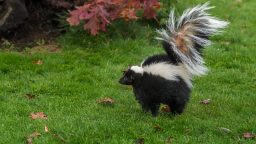You’ll smell your neighborhood skunk before you see it. No matter how hard they try not to, these critters give off a pungent odor. Although skunks do just want to be left alone, they can cause a number of issues around your home, particularly if you have pets that spend time outdoors. The last thing that you want is for your beloved dog or outdoor cat to get sprayed by a skunk. Plus, the closer that it gets to winter, the more likely a skunk is to look for a fairly warm place where they can hide out once the temperatures fall. Skunks are likely to end up in your basement or inside of your foundation if you aren’t careful! Here’s what you can do to ward off these invaders.
Put Motion Sensor Lights Around Your Property
Skunks don’t like light. They are nocturnal creatures, so the best way to deter them is to make them think that it’s daytime. If you can, set up motion sensor lights all around your home and throughout your property. There are some that use only solar power, so you won’t have to worry about hardwiring them to your grid, although standard electricity-using ones work just as well. No matter which kind you’ve chosen, place them in dark corners and wherever the skunks tend to roam on your property in order to scare them off.
Harvest All of Your Fruits and Vegetables
Your garden appeals to skunks. They’re consistently in search of things to eat, which makes your plants resemble a meal. Before you winterize your garden for the year, go through and pick all of the fruits and vegetables that are still out there. If you leave anything behind, the skunks will find it and then stick around, hoping for more.
Enclose Your Trash Cans and Compost Bins
Like other outdoor critters, skunks will eat your trash. This isn’t as nice as it sounds, because the last thing that you need is a skunk hanging out where you and your children deposit your bags of garbage. In order to keep skunks away, place your trash cans in an enclosed area, like inside of a porch or in a fenced-in overhang near the garage. Make sure that each can closes securely as well. In addition, do what you need to in order to close off your compost bins as well, because skunks will get in there and eat the decaying food waste.
Eliminate Hiding Places
Skunks hide during the day. They prefer to live in isolated, dark places, such as piles of firewood, the foundation of your home, under porches, and more. In order to prevent them from ending up on your property, make sure that they can’t get into any of these locations. Seal off the underside of your porch, make sure that your firewood isn’t a hospitably hiding place, and most importantly, walk around your home look for potential openings, and then seal them off as well. Skunks won’t stick around if they have no place to live.
Keep Predators Around
Skunks will spray when they feel threatened by a dog, but the mere presence of one may be enough to keep them at bay. After all, skunks don’t want to have to deal with a predatory encounter. They’ll steer clear of your yard when they hear your pooch barking in the distance. As long as you follow all of the other advice here, you’ll never have to worry about a skunk surprising your dog, because there won’t be any reason for them to stick around and make themselves at home.


